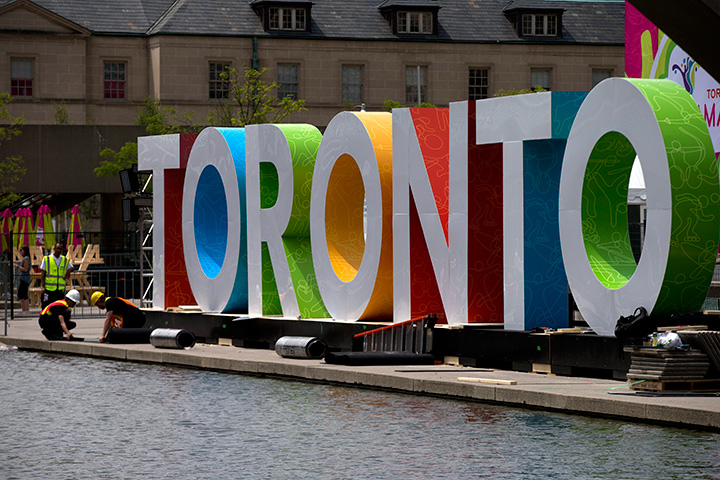Margarita De Antuñano’s parents were supposed to be here.

Instead, the septuagenarians are home in Cancun, missing their granddaughter’s high school graduation and the Pan Am Games – all because of a complex visa system they finally decided wasn’t worth navigating.
“They got halfway through and then they gave up. It was just excruciatingly hard,” De Antuñano said.
“It’s a list of over 15 documents that they need.
“And in Mexico, really, the sentiment is like, ‘Oh, we love Canada but they have made it so hard for us to go visit that we just don’t bother any more.’”
The De Antuñanos are just two of the casualties of Canada’s strict visa requirements for Mexican tourists, which have chilled relations between the two NAFTA partners and put a damper on tourism for the Pan-Am Games.
The Games, billed as an economic boon for the Toronto-area host cities, were supposed to draw thousands of visitors from across the hemisphere.
But paperwork and reams of red tape could put a crimp in those plans.
An Ontario Chamber of Commerce report last year on potential economic impacts of the Games called on the federal government to “eliminate needless complexity in the Canadian travel visa application process,” and “where possible … eliminate the visa requirement” entirely.
Last week, the head of the Greater Toronto Hotel Association told Global News hotel bookings are “starting to move” but are still below where he’d like them at this point in peak summer tourism season.
“I think that we could have had probably double the visitors had we not had these regulations,” De Antuñano said.

Get breaking National news
READ MORE: Will last-minute travellers save the Pan-Am Games?
Tourism Toronto Executive Vice-President Andrew Weir isn’t surprised to hear that. When Canada put the visa requirement in place six years ago, he said, Mexican tourists flocking to the Toronto area dropped from 80,000 to below 20,000.
“The visa situation from a number of countries, including Mexico and Brazil, has been a real challenge over the last number of years,” he said.
“I don’t know how many people may have come from the Games and didn’t, but it’s definitely been a challenge in those markets.”
Weir noted that many of the Pan Am tourists his organization’s now courting are those who’d drive to see the Games from elsewhere in Canada or the U.S., rather than fly from farther-flung Latin American countries.
But the travel restrictions certainly don’t help Canada compete for tourist dollars with the United States, which has been easing its own rules recently.
“Other countries, they’ve just made it easier, faster than Canada has,” Weir said.
“And it has put us at a competitive disadvantage.”
Citizenship and Immigration spokesperson Bruce Hicks said in an e-mail the federal government “is committed to facilitating legitimate trade and travel.” He noted Ottawa has established a program meant to expedite tourist visas for repeat visitors from multiple countries, including Mexico, China, India and Brazil. That program comes into effect in March.
“Citizenship and Immigration Canada (CIC) worked closely with the Games Organizing Committee, TO2015, to make it as easy as possible for Games participants and officials to enter Canada,” he wrote.
As director of the Canada Mexico Cultural Exchange Centre, Hamilton resident De Antuñano has seen firsthand the economic toll of tightened travel rules. Many of the English-language exchange programs she works with have had to close because Mexican attendees have dried up.
“It has deep economic repercussions,” she said.
“I’m in constant touch with people who want to come here. And most of them they kind of give up when they see the requirements.”
Canada has required Mexican tourists to get a visa since 2009 – ostensibly to curb high numbers of refugee claimants.
But the move soured relations with Mexico and has prompted calls from businesses, tourism boards and politicians to reverse it.
“We’re really mad,” then-ambassador Francisco Suarez said in 2013.
“Canada has the most stringent visa system for Mexicans of any country in the world.”
Liberal Leader Justin Trudeau has pledged to eliminate the visa requirement if he’s elected Prime Minister in October.
Ottawa plans to ease the process somewhat with an expedited option for Mexicans who’ve visited Canada in the past decade. That doesn’t come into force until next March, however.
In the meantime, De Antuñano said, her parents’ planned trip to Ontario will have to wait.
“Our family has been separated for over a year now. It is very sad.”
- Michael Kovrig reflects on ‘brutally hard’ Chinese detention: ‘You’re totally alone’
- After controversial directive, Quebec now says anglophones have right to English health services
- Something’s fishy: 1 in 5 seafood products are mislabelled, study finds
- Conservatives set to table non-confidence motion Tuesday. What to expect









Comments